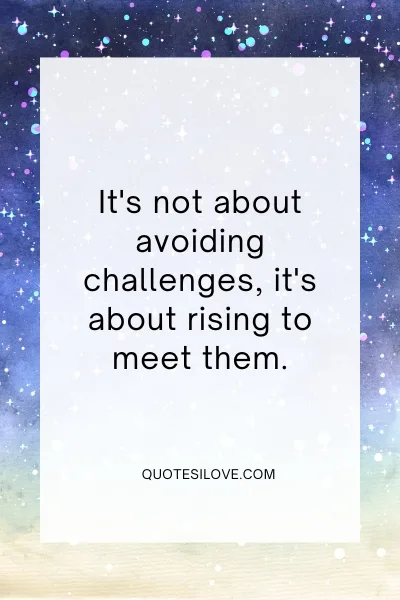Resilience: Turning Challenges Into Opportunities For Growth

Table of Contents
Understanding Resilience: What it is and Why it Matters
Defining Resilience
Resilience is the ability to successfully navigate stressful life events, bouncing back from adversity, adapting to change, and overcoming obstacles. It's not about the absence of hardship, but rather the capacity to effectively manage and learn from challenges. Resilient individuals don't shy away from difficulties; instead, they view them as opportunities for growth and learning. Consider individuals like Malala Yousafzai, who, despite facing immense adversity, persevered in her fight for education. Or Nelson Mandela, whose unwavering spirit led him from imprisonment to the presidency of South Africa. Their actions embody the essence of resilience.
The Benefits of Resilience
The benefits of building resilience extend far beyond simply overcoming a single challenge. It impacts every facet of your life:
- Improved stress management: Resilience equips you with effective coping mechanisms to handle stress more effectively.
- Increased self-esteem and confidence: Successfully overcoming challenges boosts self-belief and fosters a sense of self-efficacy.
- Enhanced problem-solving skills: Resilience cultivates a proactive approach to problem-solving, leading to more creative and effective solutions.
- Greater emotional regulation: Resilient individuals are better able to manage and understand their emotions, preventing emotional overwhelm.
- Stronger relationships: Resilience fosters empathy and understanding, leading to stronger, more supportive relationships.
- Increased career success and job satisfaction: The ability to adapt to change and overcome obstacles is invaluable in the workplace, leading to greater career satisfaction and success.
Building Your Resilience: Practical Strategies and Techniques
Cultivating a Positive Mindset
A positive mindset is the cornerstone of resilience. This doesn't mean ignoring negative feelings; it's about consciously choosing to focus on solutions, strengths, and possibilities. Techniques to cultivate positivity include:
- Practicing gratitude: Regularly reflecting on things you're grateful for shifts your focus towards the positive aspects of your life.
- Focusing on strengths: Identify your strengths and talents, and utilize them to overcome challenges.
- Mindfulness and meditation: These practices enhance self-awareness and emotional regulation, allowing you to respond to stress more effectively.
- Cognitive reframing: Challenge negative thoughts and replace them with more realistic and positive interpretations.
Developing Coping Mechanisms
Developing healthy coping mechanisms is crucial for navigating stressful situations. These strategies help you manage difficult emotions and prevent burnout:
- Exercise and physical activity: Physical activity releases endorphins, which have mood-boosting effects.
- Healthy diet and sleep hygiene: Proper nutrition and sufficient sleep are essential for physical and mental well-being.
- Social support and connection: Leaning on supportive friends, family, or community groups provides emotional comfort and practical assistance.
- Engaging in hobbies and activities you enjoy: Engaging in enjoyable activities provides a much-needed break from stress and promotes relaxation.
- Seeking professional help when needed: Don't hesitate to seek support from therapists or counselors when facing significant challenges.
Learning from Setbacks
Resilience isn't about avoiding failure; it's about learning from it. View challenges as opportunities for growth and self-improvement:
- Analyze past failures: Objectively review past setbacks to identify contributing factors and areas for improvement.
- Extract valuable lessons: Focus on what you learned from the experience, rather than dwelling on the negative aspects.
- Adjust your approach: Use the lessons learned to refine your strategies and improve your future performance.
Resilience in Action: Real-World Examples and Case Studies
Case Study 1: The Comeback Athlete
Consider the story of a professional athlete recovering from a career-threatening injury. Their resilience lies not just in their physical rehabilitation but in their mental fortitude – their unwavering belief in their ability to return to the game stronger than before. This involved rigorous physical therapy, positive self-talk, and a strong support system.
Case Study 2: The Entrepreneurial Journey
Many entrepreneurs face countless setbacks before achieving success. Their resilience manifests in their persistence, their ability to learn from failures, and their capacity to adapt their business strategies in the face of market changes. They often credit strong networks and mentors for their success.
Inspiring Stories
Countless stories demonstrate the power of resilience. From individuals overcoming personal tragedies to businesses navigating economic downturns, the common thread is the ability to adapt, learn, and persevere. These narratives highlight the universality and transformative power of building resilience.
Conclusion
Resilience is not an innate trait; it’s a skill you can cultivate and strengthen. By understanding its definition, recognizing its benefits, and actively implementing the strategies outlined above – cultivating a positive mindset, developing healthy coping mechanisms, and learning from setbacks – you can significantly enhance your ability to overcome challenges and transform adversity into growth. Start building your resilience today! Embrace challenges as opportunities for personal growth and unlock your full potential. Learn more about developing your resilience and transforming adversity into success, and build a life filled with strength and perseverance. Overcome challenges and achieve sustainable personal growth. Master stress management and build a resilient life.

Featured Posts
-
 The Construction And Deployment Of Chinas Orbital Supercomputer
May 20, 2025
The Construction And Deployment Of Chinas Orbital Supercomputer
May 20, 2025 -
 Hmrc Nudge Letters What Uk Households Need To Know
May 20, 2025
Hmrc Nudge Letters What Uk Households Need To Know
May 20, 2025 -
 Uusi Valmennus Huuhkajille Mitae Odottaa Mm Karsinnoissa
May 20, 2025
Uusi Valmennus Huuhkajille Mitae Odottaa Mm Karsinnoissa
May 20, 2025 -
 Amazons Spring 2025 Sale Deep Discounts On Hugo Boss Perfumes
May 20, 2025
Amazons Spring 2025 Sale Deep Discounts On Hugo Boss Perfumes
May 20, 2025 -
 Wayne Gretzky Fast Facts Records And Legacy
May 20, 2025
Wayne Gretzky Fast Facts Records And Legacy
May 20, 2025
